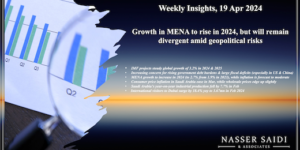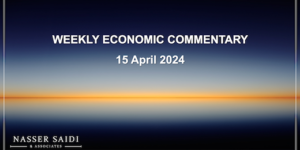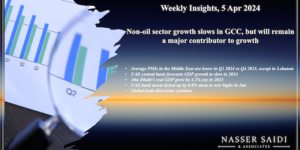Markets
Equity markets were mixed this week – Asian markets were down mid-week following a significant sell-off and rebounded after the US Fed upgraded its assessment of the economy and pledged to keep interest rates low. All seven Gulf markets were down on Wednesday, with DFM recording the biggest one day loss since June. The dollar declined 0.6% on the week against the euro, as growth in Eurozone’s two largest economies boosted sentiment. Commodities rose in line with the rising equity markets; oil has jumped above $70 on evidence of growth and recovery.
Global Developments
USA: The Federal Reserve sounded more optimistic on the economy (mentioning that “economic activity is leveling out”), maintained the dovish stance on rates (“economic conditions are likely to warrant exceptionally low levels of the Federal Funds rate for an extended period”) and extended the $300bn program to buy Treasury bonds until October. July retail sales were marginally lower due to a drop in building materials and gasoline. Industrial output increased in July supported by a 20% rebound in production of motor vehicles and parts. The positive news was overshadowed by a decline in consumer confidence in August.
Europe: Eurozone’s June industrial production was down, due to weak production of consumer durables (-25% yoy), weaker than suggested by the earlier published country data earlier. Provisional second quarter GDP data released by Germany and France both rose 0.3% qoq, with consumption, public expenditures and net trade the key drivers in France. However, the Euro zone flash GDP estimates suggest stabilization, with growth easing by 0.1% qoq, less than in Q1 2009.
Asia and Pacific: Growth signals strengthen. China’s outstanding loans and money supply moderated in July, coming a few weeks after officials cautioned against accelerated loan growth. Other data releases for July showed strong retail sales and 10.8% yoy growth in industrial production. India’s industrial production for June registered the highest growth since Feb08, supported by strong growth in capital goods. This rise is in line with earlier reported PMI and motor vehicle sales data. Hong Kong GDP registered +3.3% qoq in Q2, after 4 consecutive contraction quarters (pickup in consumption and trade). Singapore’s final Q2 09 real GDP fell by 3.5% yoy but there were improvements in both domestic demand and trade, with improvement in retail sales. Japan’s June machinery orders increased strongly, with manufacturing up while non-manufacturing turned positive for the first time in four months.
Bottom line: A host of data from the US and Europe seem to indicate a stabilization – the Fed acknowledging that a “leveling” has happened; France and Germany registering positive GDP growth for Q2. Our reading is that the worst is over even if some data on retail sales and GDP (e.g. Spain) are disappointing. On the other hand, private consumption (aided by government stimulus) and trade are helping Asia recover and grow, with Hong Kong being the latest to release positive growth for Q2, suggesting that the trading nations (Singapore, Hong Kong) are recovering.
Regional Developments
- The Central Bank of Oman has announced an issue of government development bonds worth OMR 50mn, with a three-year maturity period and a coupon rate of 4% a year. We are seeing the beginnings of a GCC debt market with more governments issuing bonds and Sukuk.
Market Intelligence on the UAE
- An amendment to the Federal Law No 8 of 1984 abolished the minimum capital requirement of AED 150,000 for the establishment of a limited liability company in the UAE and also allows new businesses to determine the capital required for the establishment and sustainability of their companies. This provides incentives for SMEs, will lower the cost of doing business and will encourage new business formation, spur entrepreneurship, increase domestic investment and promote foreign investment.
- The Payments System Settlement Finality Law enacted last week is the first in the MENA region and paved the way for the launch of high value, Real-time Automated Payments at DIFC (RAPID), which will help financial companies and their customers in undertaking secure payments with settlement finality.
- Details about the Dubai Support Fund were announced last week, including information about the composition of the board as well as the role of the fund. An independent legal entity, the Support Fund is authorized to invest in, hold and manage debt instruments on behalf of the Government of Dubai, to collect loan repayments and also re-invest these revenues. It can also provide loans and credit facilities on a commercial basis to Government and GREs. The announcement comforted the markets and allayed uncertainty concerning Dubai’s finances.
- Moody’s has placed four UAE banks on review for possible downgrade – Emirates Bank International, National Bank of Dubai, Mashreq Bank and Dubai Islamic Bank – due to their exposure to the real estate sector and overall challenges facing the financial sector including rising corporate defaults and an increase in delinquencies from retail and personal lending.
- Dubai hotels and hotel apartments received 3.85 million guests in the first half of 2009, up 5% yoy. Figures released by the Dubai Department of Tourism and Commerce Marketing also showed an average occupancy of 90% in the first week of Aug09. This suggests strength in the tourism sector, supported by demand-encouraging pricing.
- Private gross fixed capital formation shot up to a record AED 217.3bn in 2008, boosting the private sector’s share of total investment to around 72%, from a low AED 47.2bn in 2005. A breakdown showed investments in the real estate sector touched AED 32.2bn in 2008 (2005: AED 13.8bn).





